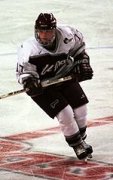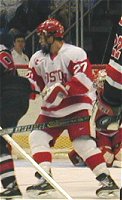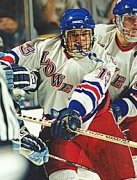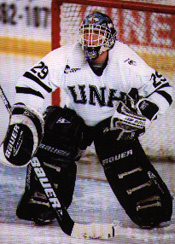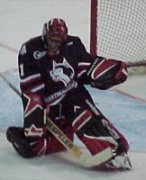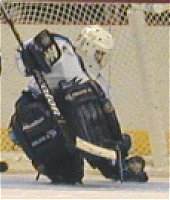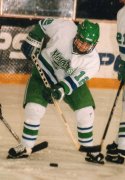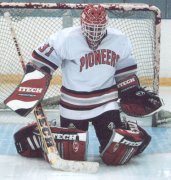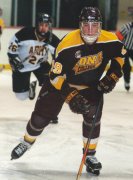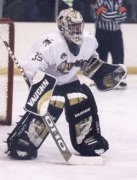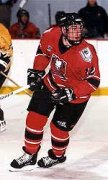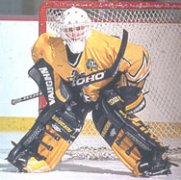Anybody out there remember being picked on as a little kid? I know I sure do, and I hated every minute of it. But somewhere, somehow, you always swore that your day would come. That there would be a day that you weren’t so little anymore, and that, even though you wouldn’t be able to beat up the whole world, you’d at least get the chance.
Well that day has come for the 11 schools and their coaches and players in the Metro Atlantic Athletic Conference.
After two full seasons of getting pushed around, getting beat up, and even worse — being called mean names — the MAAC will get its chance to shine this March thanks to a decision by the NCAA to grant the conference a bid to the national championship. For the first time since 1985, when the then-brand-new Hockey East Association was formed, the NCAA will allow a new league an automatic berth.
Now before all the fans out there start sending hate mail telling me that the MAAC is nowhere near the talent level of the “Big Four” conferences, I’ll concede that fact. But no one out there can say that the MAAC will not have a chance to prove itself.
And that opportunity may be exactly what the doctor ordered. For the first two seasons of MAAC hockey, only a few teams from the Big Four scheduled MAAC schools. This season, that number has expanded. Schools such as Minnesota, Maine, Providence, Yale, Cornell, RPI, and UMass Amherst, among others, all will face MAAC opponents in the regular season.
There definitely is a sense of bigger-time hockey around the MAAC. AIC head coach Gary Wright summed this up well, noting that this is the earliest he can ever remember being on the ice. His Yellow Jackets play an exhibition game the weekend of Oct. 7, marking the first time in school history that AIC has suited up before the last weekend on October.
You can feel the intensity among the coaches. Sure, everyone had their friendly face put on at the recent MAAC media day, but mentally, every one of the coaches was elsewhere — mostly back on campus thinking about the day’s practice.
But as much as things have changed with the MAAC with the addition of the NCAA tournament bid, one thing has stayed the same: parity. In the preseason coaches’ poll, the middle-of-the-pack teams, those seeded fourth through eighth, were tighter than Britney Spears’ outfit on her last concert tour. Only three votes separated number-four Army from number-seven Canisius, and teams like Iona, which registered third, and Holy Cross, which fell into the eighth slot, can’t feel much higher or lower than the rest of the pack.
There was, though, a clear message from the coaches regarding Quinnipiac and Mercyhurst — these are the teams to beat. For the second consecutive season, Quinnipiac topped the coaches’ poll with 113 votes. But Mercyhurst, which surprised last season by finishing in second place in the team’s first year in the conference, placed a close second in the poll with 105 votes.
Iona and Army were the coaches’ other choices for home ice, while Connecticut, Sacred Heart, Canisius and Holy Cross are picked to make the playoffs. That leaves AIC, Bentley and Fairfield to pull up the rear.
Or does it? Can a team like Bentley surprise folks? Can a new coach in Jim Hunt revive a struggling Fairfield program? Read on to each team’s preseason profile by clicking on the links below.
And to give you something to think about on your way there, here’s my take on the MAAC league. I don’t call myself the Swami by any means, so don’t head to Vegas to bet the house.
1. Quinnipiac Location: Hamden, Conn.
Coach: Rand Pecknold (sixth season, 75-48-9)
Last year: 27-6-3 (23-1-3 MAAC)
Lettermen Returning/Lost: 21/3
The strong keep getting stronger. But can the Braves win come playoff time, now that it means the NCAA bid?
2. Mercyhurst Location: Erie, Pa.
Coach: Rick Gotkin (12th season, 187-110-15)
Last year: 22-10-4 (19-6-2 MAAC)
Lettermen Returning/Lost: 19/7
As much talent as this team lost, it’s still hard to imagine them finishing far from the top.
3. Army
Location: West Point, N.Y.
Coach: Rob Riley (15th season, 202-216-23)
Last Year: 13-17-2 (1-9-0 CHA)
Lettermen Returning/Lost: 19/5
Last year’s record in the CHA doesn’t reflect much in the MAAC. Army has enjoyed success against MAAC opponents in the past. Expect that to continue.
4. Canisius
Location: Buffalo, N.Y.
Coach: Brian Cavanaugh (19th season, 259-223-32)
Last year: 21-10-4 (16-8-3 MAAC)
Lettermen Returning/Lost: 19/9
All-league goaltender Sean Weaver is half the reason you pick Canisius to finish near the top — good coaching is the other.
T5. Sacred Heart
Location: Fairfield, Conn.
Coach: Shaun Hannah (fourth season, 35-45-1)
Last year: 16-15-3 (14-10-3 MAAC)
Lettermen Returning/Lost: 23/3
Last year’s coach of the year, Shaun Hannah, didn’t lose much. A great goaltender will be the surfboard the Pioneers might ride to home ice.
T5. Iona
Location: New Rochelle, N.Y.
Coach: Frank Bretti (third season, 17-38-3)
Last year: 17-17-3 (13-12-2 MAAC)
Lettermen Returning/Lost: 22/5
Iona is the dark horse, hands down. It’s hard to pick the Gaels for the top three like the coaches did, but it’s hard to imagine a team with Iona’s depth will finish below fifth. Don’t be surprised to see them at the top.
7. Connecticut Location: Storrs, Conn.
Coach: Bruce Marshall (12th season, 170-108-23)
Last year: 19-16-1 (15-11-1 MAAC)
Lettermen Returning/Lost: 18/8
Key losses will keep UConn from repeating the Cinderella season of last. The Huskies will make the playoffs, and maybe even make a rumble, but not before taking plenty of regular-season bumps and bruises along the way.
8. Holy Cross Location: Worcester, Mass.
Coach: Paul Pearl (fifth season, 66-38-7)
Last year: 8-24-3 (8-16-3 MAAC)
Lettermen Returning/Lost: 17/10
Holy Cross feels like BU last season in Hockey East. Almost impossible to pick them eighth, but as the goaltender goes, so might the Crusaders. New prospects in the position leave HC’s fate up in the air.
9. American International
Location: Springfield, Mass.
Coach: Gary Wright (16th season, 187-206-24)
Last year: 7-20-3 (5-19-3 MAAC)
Lettermen Returning/Lost: 15/6
Unlike a season ago, I think there may be a more defined dropoff between the number eight and nine teams. AIC has some talent, but also a lot of holes. Gary Wright’s experience as a coach is one thing the Yellow Jackets can rely on, and may be the only thing that gets them to the postseason.
10. Fairfield
Location: Fairfield, Conn.
Coach: Jim Hunt (first season)
Last year: 3-28-3 (3-22-2 MAAC)
Lettermen Returning/Lost: 20/6
With new head coach Jim Hunt at Fairfield, expect to see the Stags move from the bottom of the MAAC — just not this season. There are plenty of talented sophomores, but still too many underclassmen.
11. Bentley
Location: Waltham, Mass.
Coach: Jim McAdam (eighth season, 93-85-12)
Last year: 7-23-2 (7-18-2 MAAC)
Lettermen Returning/Lost: 21/7
This is the team which will have to rebuild the most. Jim McAdam, the classiest of coaches, is honest with himself and everyone else when he says: “It’s going to be a long year.”
